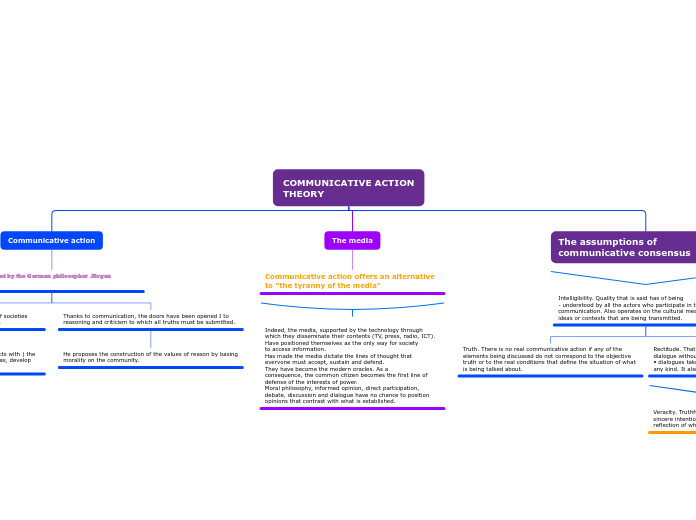COMMUNICATIVE ACTION
THEORY
Communicative action
Was proposed by the German philosopher Jürgen Habermas
Relations between people and the construction of societies went from being defined by beliefs in the sacred.
Based on the idea that people are rational subjects with | the capacity to understand each other, exchange ideas, develop them and develop.
Thanks to communication, the doors have been opened I to reasoning and criticism to which all truths must be submitted.
He proposes the construction of the values of reason by basing morality on the community.
The media
Communicative action offers an alternative to "the tyranny of the media"
The assumptions of communicative consensus
Indeed, the media, supported by the technology through
which they disseminate their contents (TV, press, radio, ICT).
Have positioned themselves as the only way for society
to access information.
Has made the media dictate the lines of thought that
evervone must accept, sustain and defend.
They have become the modern oracles. As a
consequence, the common citizen becomes the first line of defense of the interests of power.
Moral philosophy, informed opinion, direct participation,
debate, discussion and dialogue have no chance to position opinions that contrast with what is established.
Intelligibility. Quality that is said has of being
- understood by all the actors who participate in the communication. Also operates on the cultural meanings of the ideas or contexts that are being transmitted.
Truth. There is no real communicative action if any of the elements being discussed do not correspond to the objective truth or to the real conditions that define the situation of what is being talked about.
Rectitude. That every speaker accepts a set of rules for dialogue without exception. Guarantees that
• dialogues take place on equal terms, without privileges of any kind. It also refers to the neatness of tone and content.
Veracity. Truthfulness has to do with the participant's
sincere intention that what he/she expresses is a true reflection of what he/she believes or thinks.
